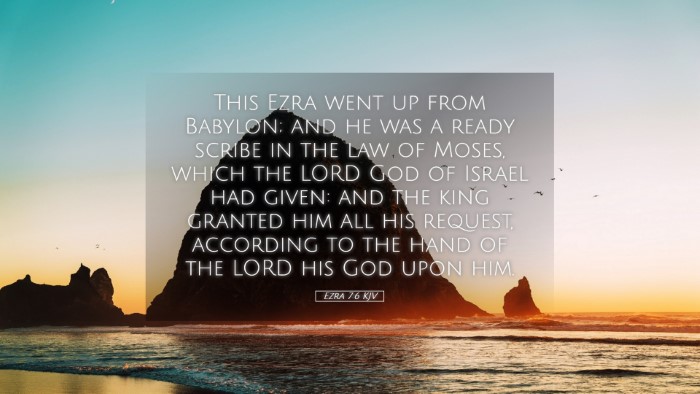Old Testament
Genesis Exodus Leviticus Numbers Deuteronomy Joshua Judges Ruth 1 Samuel 2 Samuel 1 Kings 2 Kings 1 Chronicles 2 Chronicles Ezra Nehemiah Esther Job Psalms Proverbs Ecclesiastes Song of Solomon Isaiah Jeremiah Lamentations Ezekiel Daniel Hosea Joel Amos Obadiah Jonah Micah Nahum Habakkuk Zephaniah Haggai Zechariah MalachiEzra 7:6
Ezra 7:6 KJV
This Ezra went up from Babylon; and he was a ready scribe in the law of Moses, which the LORD God of Israel had given: and the king granted him all his request, according to the hand of the LORD his God upon him.
Ezra 7:6 Bible Commentary
Commentary on Ezra 7:6
Ezra 7:6: "This Ezra went up from Babylon; and he was a ready scribe in the law of Moses, which the Lord God of Israel had given: and the king granted him all his request, according to the hand of the Lord his God upon him."
Introduction
The passage introduces us to Ezra, a pivotal figure in the restoration of Jerusalem and the Jewish people after the Babylonian exile. Understanding Ezra's character and mission offers profound insights into the restoration of the law and the spiritual life of Israel.
Ezra's Background and Qualifications
Ezra is described as a “ready scribe,” indicating his preparedness and proficiency in the law of Moses. This designation reflects not only his education but his commitment to understanding and teaching God’s commands.
- Matthew Henry emphasizes Ezra's dedication: “He was a master of the law, well versed in the statutes and regulations which God had delivered to His people.”
- Albert Barnes notes that Ezra's knowledge positioned him as a key leader for reform, as he could communicate the laws necessary for guiding the community in righteousness.
- Adam Clarke points out that being a “scribe” indicates a learned individual, adept in the sacred texts and authoritative in religious matters.
The Significance of the Law
The "law of Moses" is central to Israel’s identity and covenant relationship with God. Ezra’s role was not merely administrative; it was profoundly spiritual. His function as a scribe underscores a commitment to restoring genuine worship among the people.
- Henry highlights that the law represents a gift from God, crucial for guiding the moral and spiritual lives of the Israelites.
- Barnes elucidates that the adherence to the law is the foundation of national life and religious practice, which had diminished during the Babylonian captivity.
- Clarke reflects on the urgency of Ezra's mission, as reestablishing the law was critical to reaffirming the Jewish identity after returning from exile.
The Role of the King
The verse indicates that “the king granted him all his request.” This highlights the importance of divine favor, which is a recurring theme in Ezra's narrative. Ezra's requests to King Artaxerxes were influenced by God’s guiding hand.
- Henry observes that God’s providence often works through secular authorities to fulfill spiritual purposes, as seen in the king’s generous support for Ezra’s journey.
- Barnes remarks on the significance of this royal decree as a clear signal of God’s blessing and authority backing Ezra’s mission.
- Clarke emphasizes that the king’s willingness to aid Ezra serves as an indicator of the favorable disposition toward the Jewish people following their return from captivity.
The Hand of the Lord
Ezra's success is credited to "the hand of the Lord his God upon him." This phrase epitomizes the divine support that empowers leaders in their tasks.
- According to Henry, this divine influence strengthens Ezra, enabling him to fulfill the mission with faithfulness and courage.
- Barnes points out that God’s hand symbolizes His protection and guidance, essential for the leadership of God’s people.
- Clarke offers that recognizing God's hand in our endeavors is pivotal; it highlights the source of strength and wisdom amid challenges.
Implications for Today
Ezra's account is rich with implications for contemporary believers and church leaders. His commitment to the Word and reliance on divine guidance serve as a model for spiritual leadership in any era.
- Spiritual Preparation: Just as Ezra was prepared as a scribe, modern leaders must invest in scriptural knowledge and spiritual formation.
- Recognition of God’s Providence: Believers should remain attentive to how God may work through different avenues, including secular authorities, to accomplish His purposes.
- Leadership Integrity: Effective leadership, as shown by Ezra, combines knowledge of God's law with a heart for His people, ensuring the faithfulness of the community to God.
Conclusion
Ezra 7:6 presents a multifaceted view of leadership, faithfulness to God’s law, and the influence of divine providence in the affairs of men. It encourages pastors, students, and scholars alike to reflect on their own roles in understanding and disseminating God's Word, embodying the principles exemplified by Ezra during a critical moment in Israel's history.


